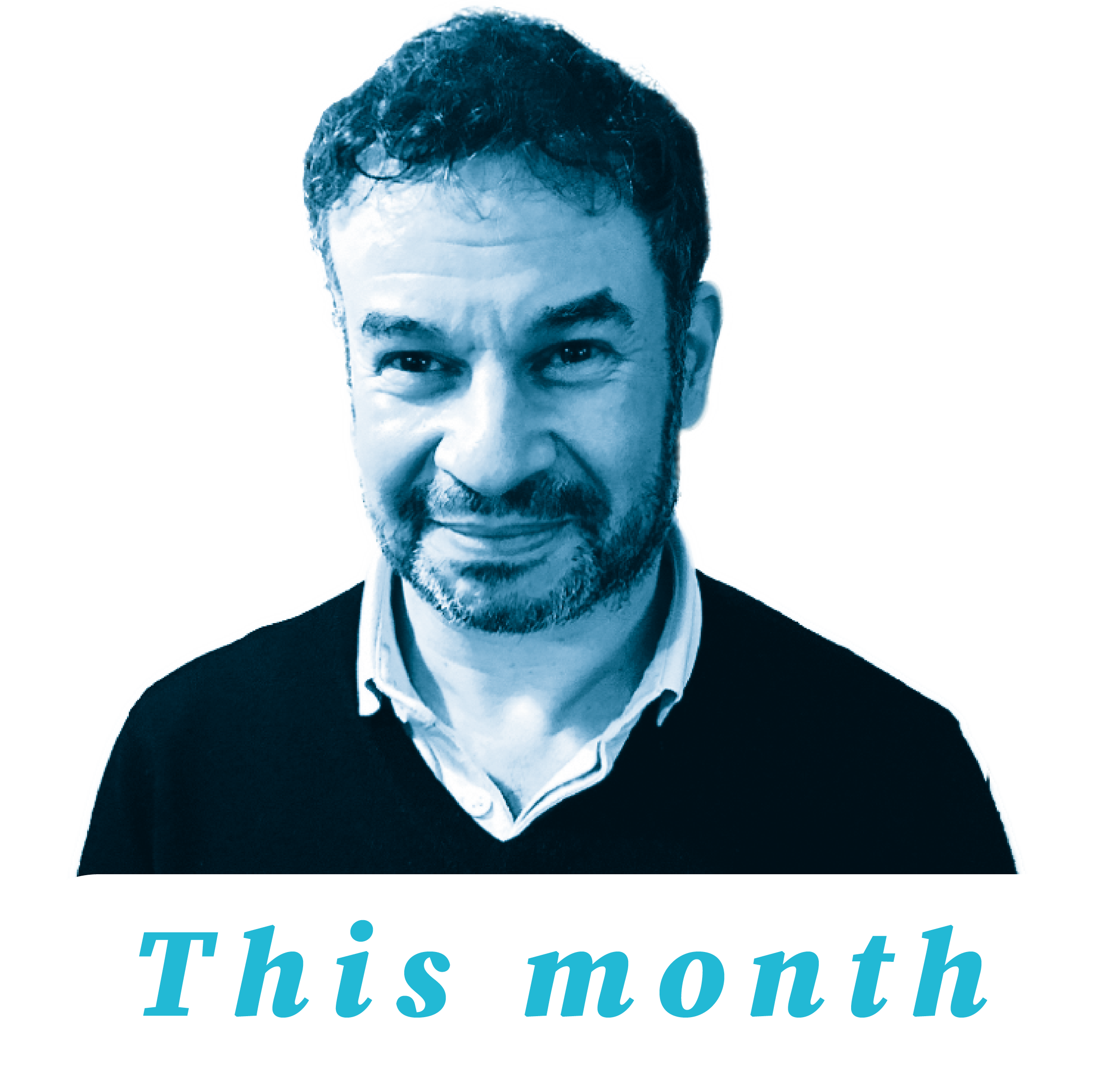THE ACCOUNT
The latest in finance and business

THE ACCOUNT
The latest in finance and business

Boarding card
The Apprentice reaches its climax this month and will include the enduringly popular “interview” episode in which the final five contestants have their business plans sliced and diced for the cameras.
One of the sternest interviewers is Mike Soutar, who we spoke to for our February issue. Since then, the Scottish-born entrepreneur and investor has been appointed to a UK government role.
Soutar is now one of 10 business leaders chosen for the new Board of Trade. He and his colleagues will act as advocates and ambassadors for their respective sectors, supporting growth across the country’s 5.5 million SMEs. The board also includes Paul Lindley, founder of Ella’s Kitchen, who talked about the need to reshape capitalism in these pages in October 2022.
Business and Trade Secretary, Jonathan Reynolds, insisted this new Board of Trade would not be a “chin-stroking talking shop”. “It will be another tool in our arsenal to get more businesses trading around the world and taking advantage of our fantastic free trade agreements.”
Soutar wrote on LinkedIn: “I’m passionate about helping businesses – particularly in media, technology and the creative industries – to seize international opportunities. The UK has world-class talent, but turning that potential into globally competitive businesses requires the right networks.”

Boarding card
The Apprentice reaches its climax this month and will include the enduringly popular “interview” episode in which the final five contestants have their business plans sliced and diced for the cameras.
One of the sternest interviewers is Mike Soutar, who we spoke to for our February issue. Since then, the Scottish-born entrepreneur and investor has been appointed to a UK government role.
Soutar is now one of 10 business leaders chosen for the new Board of Trade. He and his colleagues will act as advocates and ambassadors for their respective sectors, supporting growth across the country’s 5.5 million SMEs. The board also includes Paul Lindley, founder of Ella’s Kitchen, who talked about the need to reshape capitalism in these pages in October 2022.
Business and Trade Secretary, Jonathan Reynolds, insisted this new Board of Trade would not be a “chin-stroking talking shop”. “It will be another tool in our arsenal to get more businesses trading around the world and taking advantage of our fantastic free trade agreements.”
Soutar wrote on LinkedIn: “I’m passionate about helping businesses – particularly in media, technology and the creative industries – to seize international opportunities. The UK has world-class talent, but turning that potential into globally competitive businesses requires the right networks.”
CAs in the news
Craig Strachan CA
Congratulations to Craig Strachan CA, who has won the One to Watch category at last month’s Scottish CFO Awards. Strachan holds that role at Scotmid Co-operative, which was founded in 1859 and is Scotland’s largest independent co-operative. He joined Scotmid in June 2023 after years with the Start-Up Drinks Lab, which he co-founded.
Becky Lumsden CA
The former Deputy Convener of the Business Policy Committee at ICAS, Becky Lumsden CA, is the founder and CEO of Pure Spa & Beauty. She recently announced the launch of its Pure Wellness concept, with the existing Pure premises in Aberdeen’s Union Square shopping centre chosen as the location for its first venture into the popular wellness space.
Mark Hay CA
Mark Hay CA has been appointed the new Accounts Manager at the Inverurie office of James Milne Chartered Accountants. Hay arrives from Hall Morrice, having also previously spent 17 years at Henderson Loggie. “I’m a local lad, born and raised in Aberdeenshire, so I know the area well and the challenges and opportunities facing clients in this area,” he said.
Park life
Recently the Cairngorms national park, in north-east Scotland, discovered there was too much wildlife, specifically deer, roaming its lands, resulting in damage to the natural habitat. That growth in the deer population had to be tackled.
So, as part of Cairngorms 2030, a multi-programme strategy aimed at pushing the park to net zero, the Cairngorms National Park Authority (CNPA) initiated a project that now sees wild venison being served in food banks and even local schools.
The CNPA also started a carbon-friendly local market for the meat, so the venison will also be sold to local shops, hotels and restaurants.
“This is an exciting project that will help farmers tackle a long-running problem, support the wider community, and preserve fragile habitats,” Sandy Bremner, Convener at the CNPA, told Positive News.
The authority also hopes it will inspire other national parks to consider how they can work with their local communities. You can read more about CAs in conservation in our feature this month.

Park life
Recently the Cairngorms national park, in north-east Scotland, discovered there was too much wildlife, specifically deer, roaming its lands, resulting in damage to the natural habitat. That growth in the deer population had to be tackled.
So, as part of Cairngorms 2030, a multi-programme strategy aimed at pushing the park to net zero, the Cairngorms National Park Authority (CNPA) initiated a project that now sees wild venison being served in food banks and even local schools.
The CNPA also started a carbon-friendly local market for the meat, so the venison will also be sold to local shops, hotels and restaurants.
“This is an exciting project that will help farmers tackle a long-running problem, support the wider community, and preserve fragile habitats,” Sandy Bremner, Convener at the CNPA, told Positive News.
The authority also hopes it will inspire other national parks to consider how they can work with their local communities. You can read more about CAs in conservation in our feature this month.
State of play
The International Accounting Bulletin World Survey 2025 was released on 10 March. The results were collated from 33 accountancy networks and 18 accounting associations. Headline findings include the following:
• Overall growth for the profession remained positive at 7%, slightly down from 8% the previous year.
• Growth among the Big Four slowed compared with last year. Deloitte, EY and PwC each had 4% growth, down from 9% for the first two and 6% for PwC. KPMG stayed the same at 5%.
• The top 10 networks outside the Big Four all grew by 6% or more, with half achieving double-digit growth.
• Overall there was a 1% increase on staff numbers.
• Staff growth among the associations increased by 9% to 292,049, up from 250,297 last year.
You can read the report in full here.

State of play
The International Accounting Bulletin World Survey 2025 was released on 10 March. The results were collated from 33 accountancy networks and 18 accounting associations. Headline findings include the following:
• Overall growth for the profession remained positive at 7%, slightly down from 8% the previous year.
• Growth among the Big Four slowed compared with last year. Deloitte, EY and PwC each had 4% growth, down from 9% for the first two and 6% for PwC. KPMG stayed the same at 5%.
• The top 10 networks outside the Big Four all grew by 6% or more, with half achieving double-digit growth.
• Overall there was a 1% increase on staff numbers.
• Staff growth among the associations increased by 9% to 292,049, up from 250,297 last year.
You can read the report in full here.
Doctrine shock
Until recently, the perceived wisdom was that Milton Friedman’s shareholder primacy theory, aka the Friedman Doctrine, that “a company’s only social responsibility is to increase profits for its shareholders”, was becoming a thing of the past.
Shareholder activism was on the rise and businesses needed to focus on wider stakeholders, as summed up in the initialism ESG (environmental, social, governance). Of course, every functioning business needs to operate at a profit, but for a while it seemed almost as important to talk about values and purpose.
Think back just a couple of years to when Patagonia owner Yvon Chouinard donated the ownership of his outdoor clothing company to a trust, to ensure profits would be ploughed back into projects aimed at tackling the climate crisis. LinkedIn was deluged with supportive responses from the business community. A CNBC headline posed the question, “Is Patagonia the end game for profits in a world of climate change?”
The answer would now appear to be a firm no. Recently, a succession of the world’s biggest brands and richest companies have, to quote author Joan Westenberg, demonstrated “that their much-touted values have all the staying power of a Snapchat message”.
Yes, one could argue some companies had gone too far, too soon in areas such as diversity and inclusion. But in their haste to beat a retreat they have shown that what really matters is the share price and growth at all costs. Some customers will cheer their U-turns; others will be making mental notes to be sceptical of any commitments they make in the future.
If there is going to be pushback then it would appear the likeliest starting point will be with the demographic that every advertiser wants to reach – which is also the one most likely to suffer from the predicted impacts of climate change.
A recent survey, carried out for American Express and members’ club the Conduit, found that 82% of entrepreneurs and senior leaders aged 18–27 (yes, some are that young) say it is important for their company to be “purpose driven”.
They want to prove that businesses can do good while still making money. And to see the Friedman Doctrine truly becomes a thing of the past.
Ryan Herman
Doctrine shock
Until recently, the perceived wisdom was that Milton Friedman’s shareholder primacy theory, aka the Friedman Doctrine, that “a company’s only social responsibility is to increase profits for its shareholders”, was becoming a thing of the past.
Shareholder activism was on the rise and businesses needed to focus on wider stakeholders, as summed up in the initialism ESG (environmental, social, governance). Of course, every functioning business needs to operate at a profit, but for a while it seemed almost as important to talk about values and purpose.
Think back just a couple of years to when Patagonia owner Yvon Chouinard donated the ownership of his outdoor clothing company to a trust, to ensure profits would be ploughed back into projects aimed at tackling the climate crisis. LinkedIn was deluged with supportive responses from the business community. A CNBC headline posed the question, “Is Patagonia the end game for profits in a world of climate change?”
The answer would now appear to be a firm no. Recently, a succession of the world’s biggest brands and richest companies have, to quote author Joan Westenberg, demonstrated “that their much-touted values have all the staying power of a Snapchat message”.
Yes, one could argue some companies had gone too far, too soon in areas such as diversity and inclusion. But in their haste to beat a retreat they have shown that what really matters is the share price and growth at all costs. Some customers will cheer their U-turns; others will be making mental notes to be sceptical of any commitments they make in the future.
If there is going to be pushback then it would appear the likeliest starting point will be with the demographic that every advertiser wants to reach – which is also the one most likely to suffer from the predicted impacts of climate change.
A recent survey, carried out for American Express and members’ club the Conduit, found that 82% of entrepreneurs and senior leaders aged 18–27 (yes, some are that young) say it is important for their company to be “purpose driven”.
They want to prove that businesses can do good while still making money. And to see the Friedman Doctrine truly becomes a thing of the past.
Ryan Herman









